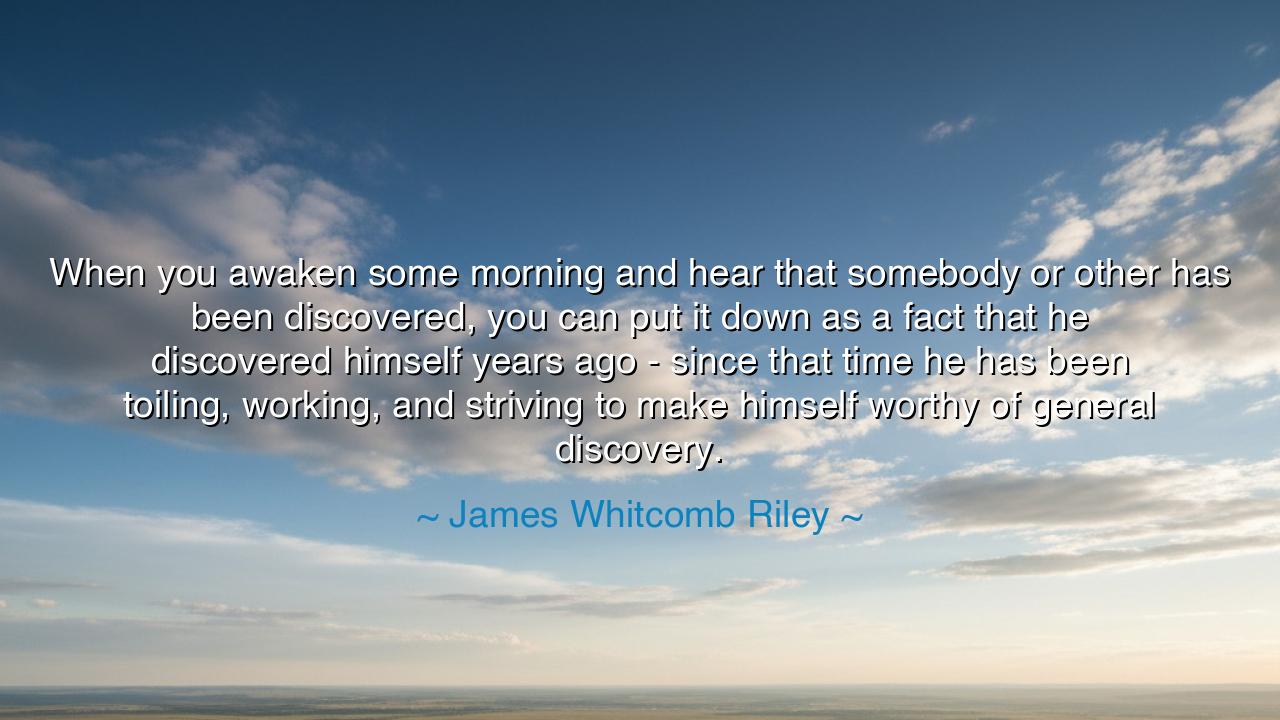
When you awaken some morning and hear that somebody or other has
When you awaken some morning and hear that somebody or other has been discovered, you can put it down as a fact that he discovered himself years ago - since that time he has been toiling, working, and striving to make himself worthy of general discovery.






The words of James Whitcomb Riley unveil a timeless truth about the nature of greatness: “When you awaken some morning and hear that somebody or other has been discovered, you can put it down as a fact that he discovered himself years ago—since that time he has been toiling, working, and striving to make himself worthy of general discovery.” It is the reminder that what the world calls “sudden success” is never sudden, that the flash of recognition is always built upon years of unseen labor.
For the world applauds the harvest, but it does not see the planting, the tending, the weeding, and the long patience of the field. When an artist, inventor, or leader appears to rise overnight, it is but the final unveiling of a foundation laid in solitude. The truth is that long before the world “discovers” someone, that person has already discovered themselves—their gifts, their calling, their discipline. They have entered into battle not against the world, but against their own weakness, and they have emerged sharpened and ready.
Think of the story of Thomas Edison, whom the world hailed as a genius when the electric light illuminated the darkness. To the public, it seemed as though he had gifted them light with a single stroke of brilliance. Yet behind that moment were years of toil, thousands of failed experiments, countless nights where he labored in obscurity. Edison had discovered himself long before the world recognized him; the “invention” was but the fruit of relentless striving, watered by endurance and fertilized by failure.
Riley’s words are a rebuke to the myth of sudden fame. The general discovery—when the crowd finally takes notice—is only the echo of a deeper, private discovery. The musician who dazzles an audience first endured endless scales in solitude. The athlete who shines under the stadium lights first ran countless laps unseen. The poet whose verses stir the soul first wrestled for years with words in silence. The glory belongs not to the moment of recognition, but to the unseen journey that prepared the soul for it.
There is also wisdom here about worthiness. Riley does not speak only of effort, but of striving to make oneself worthy of recognition. This is not about chasing the applause of others, but about living with integrity, discipline, and devotion to craft. When the world finally discovers such a person, it is not merely skill that shines forth, but character—honed by years of unseen struggle. This worthiness is what makes discovery enduring, rather than fleeting.
Consider also the example of Vincent van Gogh. In his lifetime, he was dismissed, uncelebrated, even ridiculed. Yet he had discovered himself—his vision, his colors, his brushwork. Though the world was blind to him then, his striving was not in vain. Long after his death, the world “discovered” him, but his art had already been born from the depths of self-discovery and suffering. His story reminds us that recognition may come late or not at all, but the truest triumph lies in the act of discovery within oneself.
The lesson is clear: do not seek only the moment of applause, but seek the lifelong journey of self-discovery and discipline. Do not be deceived when you see others rise suddenly—know that their moment of glory is built on unseen years of labor. And do not despair if the world does not yet see you. Strive, toil, work in silence. Make yourself worthy, and in time, whether the world discovers you or not, you will already have discovered yourself, which is the greater victory.
Thus, Riley’s words stand as both warning and encouragement: recognition is not the beginning but the end of a long path. Discovery begins within. Work patiently, with discipline and faith, and let the world’s acknowledgment come when it will. For the true triumph lies not in being found by others, but in having the courage to find, shape, and honor oneself long before the world takes notice.






AAdministratorAdministrator
Welcome, honored guests. Please leave a comment, we will respond soon